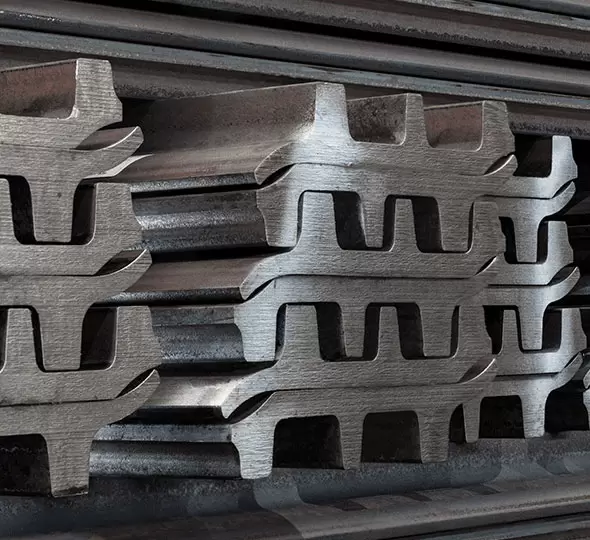High-Strength Track Shoe Steel: The Core Material in Construction Machinery
2024-11-08
With the rapid development of the construction machinery industry, the demand for high-performance materials has become more urgent. Track shoe steel is a critical component in crawler equipment, and its performance is directly related to the operational efficiency and service life of construction machinery. With its excellent wear resistance, impact resistance, and high strength, track shoe steel plays an irreplaceable role in construction machinery. This article Longteng systematically analyzes the application value of track shoe steel in construction machinery, highlights its unique technical characteristics, and explains why this material is indispensable in the industry.

The Importance of Track Shoe Steel in Construction Machinery
In construction machinery, the track plate is an essential component for equipment mobility and operation, and track shoe steel, as the material choice for this component, directly determines the durability and safety of the equipment. The use of track shoe steel allows crawler equipment to operate smoothly in complex construction environments. Its excellent load-bearing capacity and impact resistance enable it to perform well under harsh working conditions such as mining, construction engineering, and road construction. The following sections will further explore the importance of track shoe steel in construction machinery from the perspectives of wear resistance, high strength, and impact resistance.
Excellent Wear Resistance
Construction machinery typically operates in high-wear environments such as mud, sand, and rocks, necessitating that track shoes have extremely high wear resistance. Track shoe steel optimizes alloy composition and employs a special heat treatment process to effectively resist friction in high-wear environments, extending its service life. The improved wear resistance not only reduces equipment downtime and replacement frequency but also lowers maintenance costs, saving users significant operating expenses. This wear resistance is especially important in mining and construction, where friction and collision intensity are particularly high.
High Strength and Impact Resistance
High strength and impact resistance are core requirements for track shoe steel materials. During construction machinery operations, the track shoe must bear the heavy load of the equipment and withstand environmental impacts. Through special heat treatment processes and optimized alloy composition, the impact resistance of track shoe steel is significantly enhanced, allowing it to maintain structural stability and avoid breakage or deformation during high-load operations. This high strength and impact resistance are essential for safe and stable equipment operation.
Enhanced Equipment Versatility and Adaptability
The excellent performance of track shoe steel not only improves equipment durability but also enables it to adapt to various working environments. For example, under extremely high or low temperatures, track shoe steel can still maintain its excellent performance, providing construction companies with more versatile equipment. This material's durability and adaptability make track shoe steel widely used in the construction industry and a preferred material for many construction machinery applications.
Key Performance Indicators of Track Shoe Steel
As a high-strength and high-wear-resistant engineering material, track shoe steel has indicators such as hardness, strength, and toughness that directly affect its performance in harsh environments. Construction machinery imposes extremely high requirements on these performance indicators, collectively ensuring the reliability and durability of track shoe steel under intense working conditions.
Hardness
Hardness is one of the important indicators of track shoe steel, directly affecting its wear resistance. Typically, the hardness value of track shoe steel ranges between HB400 and HB500. With scientifically designed alloy composition and heat treatment, the material achieves good wear resistance. This high hardness ensures equipment stability under high friction and pressure, meeting the high wear resistance requirements of engineering machinery. The higher the hardness, the more wear-resistant the track shoe steel, which prolongs equipment service life by reducing wear over long-term use.
Toughness
Toughness is a performance characteristic that track shoe steel must possess in addition to hardness. Toughness enables track shoe steel to absorb impact energy during high-intensity impacts, preventing fractures or brittle cracking. Track shoe steel undergoes tempering during production to improve its toughness. High toughness not only ensures equipment safety but also prolongs track shoe life under heavy loads and reduces the risk of equipment failure caused by material rupture.
Tensile Strength and Yield Strength
Tensile strength and yield strength are key indicators of whether track shoe steel can maintain its shape under extreme loads. High tensile and yield strengths ensure that the track shoe does not deform easily under harsh conditions, allowing it to operate stably. These strength properties are especially important in scenarios such as mining and heavy-load transportation, where they effectively prevent deformation or fractures in the crawler plate, ensuring continuous equipment operation.
Fatigue Resistance
The fatigue resistance of track shoe steel ensures that the material remains intact under repeated stress cycles. Enhanced fatigue resistance reduces fractures or deformation due to material fatigue, lowering equipment maintenance and replacement costs. This performance makes track shoe steel more stable and reliable during prolonged use in engineering machinery.
The application of track shoe steel in the construction machinery industry not only improves equipment life and stability but also reduces maintenance and replacement costs. With its excellent wear resistance, high strength, and good toughness, track shoe steel has become a core material for many construction machinery applications. As the demand for track shoe steel in construction machinery increases, further optimization of production processes and alloy composition will allow track shoe steel to continue to excel in more complex environments, providing robust support for the efficient operation of the construction machinery industry.





















 Email
Email